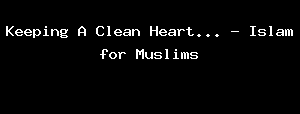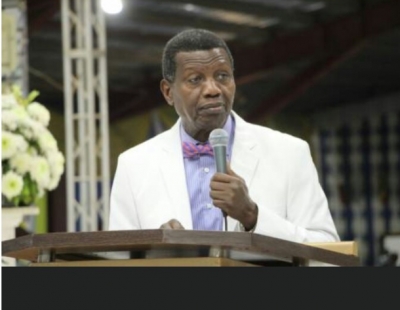Rhoddyken
Business Person : I Own A Boutique, I Also Write And Edit Articles.
Wants to meet Business Partners : All Kinds Of Business
Articles
178
Followers
21
profile/6781FB_IMG_1568668550374.jpg
Rhoddyken

Keeping A Clean Heart... - Islam For Muslims
~1.5 mins read
Harbouring malice, ill feelings and bad thoughts about another Muslim is a major sin.
To disagree, differ and, at times, experience discord with another person is normal and expected. However, a Muslim is prohibited from allowing these issues to cause him to sever his relationship with the next person.
Irrespective of the level of conflict or disagreement that may exist between two parties, it is prohibited for them to hate, spite or grudge each other or harbour ill feelings and hatred. Such an approach will be detrimental spiritually and can also affect one's physical health.
Harbouring enmity leads to distress, anxiety and restlessness. The one who holds grudges and gives vent to his anger tortures himself with the fire of jealousy and hatred. Such a person loses respect and self-esteem. The evil effect of these actions engulf his heart, causing him to become miserable and depressed.
In upholding relationships, the Qur'an advises us to take a higher moral ground,
"The good deed and the evil deed cannot be equal. Repel (the evil) with (an approach which is better) then verily (the one) with whom there was enmity, will become as though he was a close friend." (Fussilat: 34)
Thus Allah orders the faithful believers to be patient and tolerant at the time of anger, and to take to pardon those who treat you badly.
Hazrat Anas (R) narrates that Rasulullah (Sallallahu Alaihi Wasallam) said to me, 'O My Beloved son! If you are able to pass the morning and the evening in such a condition where there are no ill-feelings in your heart for anyone, then do so.'
Then Rasulullah (Sallallahu Alaihi Wasallam) said, 'O My Beloved son! That is from my Sunnah. Whoever loves my Sunnah loves me. Whoever loves me will be with me in Jannah.' (Tirmizi)
We should develop ourselves to be tolerant with others, and overlook the weaknesses of others by displaying good character.
https://www.darulihsan.com/index.php/social-etiquette/item/8556-keep-a-clean-heart
To disagree, differ and, at times, experience discord with another person is normal and expected. However, a Muslim is prohibited from allowing these issues to cause him to sever his relationship with the next person.
Irrespective of the level of conflict or disagreement that may exist between two parties, it is prohibited for them to hate, spite or grudge each other or harbour ill feelings and hatred. Such an approach will be detrimental spiritually and can also affect one's physical health.
Harbouring enmity leads to distress, anxiety and restlessness. The one who holds grudges and gives vent to his anger tortures himself with the fire of jealousy and hatred. Such a person loses respect and self-esteem. The evil effect of these actions engulf his heart, causing him to become miserable and depressed.
In upholding relationships, the Qur'an advises us to take a higher moral ground,
"The good deed and the evil deed cannot be equal. Repel (the evil) with (an approach which is better) then verily (the one) with whom there was enmity, will become as though he was a close friend." (Fussilat: 34)
Thus Allah orders the faithful believers to be patient and tolerant at the time of anger, and to take to pardon those who treat you badly.
Hazrat Anas (R) narrates that Rasulullah (Sallallahu Alaihi Wasallam) said to me, 'O My Beloved son! If you are able to pass the morning and the evening in such a condition where there are no ill-feelings in your heart for anyone, then do so.'
Then Rasulullah (Sallallahu Alaihi Wasallam) said, 'O My Beloved son! That is from my Sunnah. Whoever loves my Sunnah loves me. Whoever loves me will be with me in Jannah.' (Tirmizi)
We should develop ourselves to be tolerant with others, and overlook the weaknesses of others by displaying good character.
https://www.darulihsan.com/index.php/social-etiquette/item/8556-keep-a-clean-heart
profile/6781FB_IMG_1568668550374.jpg
Rhoddyken

Pastor Adeboye: Restructure Or Risk Breakup Of Nigeria
~2.4 mins read
General Overseer of the Redeemed Christian Church of God, Pastor Enoch Adeboye, has warned of a possible collapse of Nigeria if the Muhammadu Buhari-led government looked on while the country plunged into various insurrections and criminalities.
Adeboye disclosed this on Saturday at an event to commemorate the 60th independence anniversary of Nigeria co-organised by the Redeemed Christian Church of God and the Nehemiah Leadership Institute.
He said the restructuring of the country must be done “as soon as possible†to forestall a breakup of the various social-ethnic components that made up Nigeria.
He proposed the adoption of a merger of the British style of government and the American system of government to pave the way for Nigeria’s future.
He said, “Why can’t we have a system of government that is 100 per cent Nigerian, unique to us? For example, we started on with the British system of government, somewhere along the line, we moved over to the American system of government.
“Can’t we have a combination of both and see whether it could help us solve our problems because in Mathematics if you want to solve a problem, you try what we call Real Analysis, then if it doesn’t work, then you move on to Complex Analysis and see whether that will help you. If that fails, you move on to Vector Analysis and so on.
“I believe that we might want to look at the problems of Nigeria in a slightly different manner. Some people feel that all our problems will be over if Nigeria should break up. I think that is trying to solve the problems of Nigeria as if it is a simple equation. The problems of Nigeria will require quite a bit of simultaneous equation and some of them are not going to be linear either – forgive me I am talking as a Mathematician.
“Why can’t we have a system of government that will create what I will call the United States of Nigeria? Let me explain. We all know that we must restructure. It is either we restructure or we break, you don’t have to be a prophet to know that one. That is certain – restructure or we break up.
“If we have a President and a Prime Minister and we share responsibilities between these two so that one is not an appendage to the other. For examples, if the President controls the Army and the Prime Minister controls the Police. If the President controls resources likes oil and mining and the Prime Minister controls finance and inland revenue, taxes, customs etc. You just divide responsibilities between the two.
“At the state level, you have the governor and the premier, and the same way, you distribute responsibilities these people in such a manner that one cannot really go without the other. Maybe we might begin to tackle the problems.
“If we are going to adopt the model, then we need to urgently restore the House of Chiefs. I have a feeling that one of our major problems is that we have pushed the traditional rulers to the background and I believe that is a grave error.
“Without any doubt, we must restructure and do it as soon as possible. A United States of Nigeria is likely to survive than our present structure.â€http://saharareporters.com/2020/10/03/restructure-or-risk-breakup-nigeria-adeboye-warns-buhari
Adeboye disclosed this on Saturday at an event to commemorate the 60th independence anniversary of Nigeria co-organised by the Redeemed Christian Church of God and the Nehemiah Leadership Institute.
He said the restructuring of the country must be done “as soon as possible†to forestall a breakup of the various social-ethnic components that made up Nigeria.
He proposed the adoption of a merger of the British style of government and the American system of government to pave the way for Nigeria’s future.
He said, “Why can’t we have a system of government that is 100 per cent Nigerian, unique to us? For example, we started on with the British system of government, somewhere along the line, we moved over to the American system of government.
“Can’t we have a combination of both and see whether it could help us solve our problems because in Mathematics if you want to solve a problem, you try what we call Real Analysis, then if it doesn’t work, then you move on to Complex Analysis and see whether that will help you. If that fails, you move on to Vector Analysis and so on.
“I believe that we might want to look at the problems of Nigeria in a slightly different manner. Some people feel that all our problems will be over if Nigeria should break up. I think that is trying to solve the problems of Nigeria as if it is a simple equation. The problems of Nigeria will require quite a bit of simultaneous equation and some of them are not going to be linear either – forgive me I am talking as a Mathematician.
“Why can’t we have a system of government that will create what I will call the United States of Nigeria? Let me explain. We all know that we must restructure. It is either we restructure or we break, you don’t have to be a prophet to know that one. That is certain – restructure or we break up.
“If we have a President and a Prime Minister and we share responsibilities between these two so that one is not an appendage to the other. For examples, if the President controls the Army and the Prime Minister controls the Police. If the President controls resources likes oil and mining and the Prime Minister controls finance and inland revenue, taxes, customs etc. You just divide responsibilities between the two.
“At the state level, you have the governor and the premier, and the same way, you distribute responsibilities these people in such a manner that one cannot really go without the other. Maybe we might begin to tackle the problems.
“If we are going to adopt the model, then we need to urgently restore the House of Chiefs. I have a feeling that one of our major problems is that we have pushed the traditional rulers to the background and I believe that is a grave error.
“Without any doubt, we must restructure and do it as soon as possible. A United States of Nigeria is likely to survive than our present structure.â€
Advertisement

Link socials
Matches
Loading...
